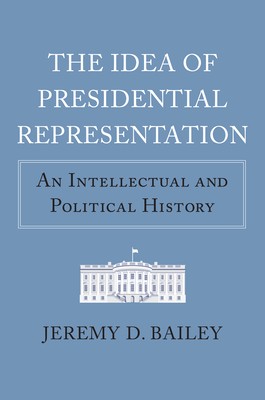
- We will send in 10–14 business days.
- Author: Jeremy D Bailey
- Publisher: University Press Of Kansas
- ISBN-10: 0700628150
- ISBN-13: 9780700628155
- Format: 15.8 x 23.6 x 2.5 cm, hardcover
- Language: English
- SAVE -10% with code: EXTRA
Reviews
Description
Does the president represent the entire nation? Or does he speak for core partisans and narrow constituencies? The Federalist Papers, the electoral college, history and circumstance from the founders' time to our own: all factor in theories of presidential representation, again and again lending themselves to different interpretations. This back-and-forth, Jeremy D. Bailey contends, is a critical feature, not a flaw, in American politics. Arriving at a moment of great debate over the nature and exercise of executive power, Bailey's history offers an invaluable, remarkably relevant analysis of the intellectual underpinnings, political usefulness, and practical merits of contending ideas of presidential representation over time.
Among scholars, a common reading of political history holds that the founders, aware of the dangers of demagogy, created a singularly powerful presidency that would serve as a check on the people's representatives in Congress; then, this theory goes, the Progressives, impatient with such a counter-majoritarian approach, reformed the presidency to better reflect the people's will--and, they reasoned, advance the public good. The Idea of Presidential Representation challenges this consensus, offering a more nuanced view of the shifting relationship between the president and the American people. Implicit in this pattern, Bailey tells us, is another equivocal relationship--that between law and public opinion as the basis for executive power in republican constitutionalism. Tracing these contending ideas from the framers time to our own, his book provides both a history and a much-needed context for our understanding of presidential representation in light of the modern presidency. In The Idea of Presidential Representation Bailey gives us a new and useful sense of an enduring and necessary feature of our politics.EXTRA 10 % discount with code: EXTRA
The promotion ends in 9d.16:55:19
The discount code is valid when purchasing from 10 €. Discounts do not stack.
- Author: Jeremy D Bailey
- Publisher: University Press Of Kansas
- ISBN-10: 0700628150
- ISBN-13: 9780700628155
- Format: 15.8 x 23.6 x 2.5 cm, hardcover
- Language: English English
Does the president represent the entire nation? Or does he speak for core partisans and narrow constituencies? The Federalist Papers, the electoral college, history and circumstance from the founders' time to our own: all factor in theories of presidential representation, again and again lending themselves to different interpretations. This back-and-forth, Jeremy D. Bailey contends, is a critical feature, not a flaw, in American politics. Arriving at a moment of great debate over the nature and exercise of executive power, Bailey's history offers an invaluable, remarkably relevant analysis of the intellectual underpinnings, political usefulness, and practical merits of contending ideas of presidential representation over time.
Among scholars, a common reading of political history holds that the founders, aware of the dangers of demagogy, created a singularly powerful presidency that would serve as a check on the people's representatives in Congress; then, this theory goes, the Progressives, impatient with such a counter-majoritarian approach, reformed the presidency to better reflect the people's will--and, they reasoned, advance the public good. The Idea of Presidential Representation challenges this consensus, offering a more nuanced view of the shifting relationship between the president and the American people. Implicit in this pattern, Bailey tells us, is another equivocal relationship--that between law and public opinion as the basis for executive power in republican constitutionalism. Tracing these contending ideas from the framers time to our own, his book provides both a history and a much-needed context for our understanding of presidential representation in light of the modern presidency. In The Idea of Presidential Representation Bailey gives us a new and useful sense of an enduring and necessary feature of our politics.

Reviews